On the corner of Rue Wellington and Rue des Sœurs-Grises in Vieux-Montréal (Old Montréal) you’ll find a red brick building that was built in 1911 (formerly home to the McClary Manufacturing Company). Inside one large space of this restored structure, there’s a symphony taking place; not with instruments, mind you, but with food and flavor.
Who’s the conductor of this orchestra? Chef Joe Mercuri.

Born and raised in Montréal, Québec, Chef Mercuri is a born entertainer. Wearing a black shirt, jeans, and a bandana to hold back his wavy locks, this restauranteur looks like he could hold his own on any stage. He’s a pro at taking the complex and making it sing.
Chef Mercuri is not a newcomer to the Montréal food scene. In 2004, he opened his first fine dining restaurant, Brontë, and quickly won EnRoute Magazine’s “Best New Restaurant in Canada” award. So it’s no surprise he’s a finalist again for the same accolade with the opening of his namesake, Mercuri.
Restaurant Mercuri is split into two spaces: Mercuri Montréal, a fine dining establishment and Bar Mercuri, a casual dining spot. Today, I’m focused on the former and the renaissance of a chef.
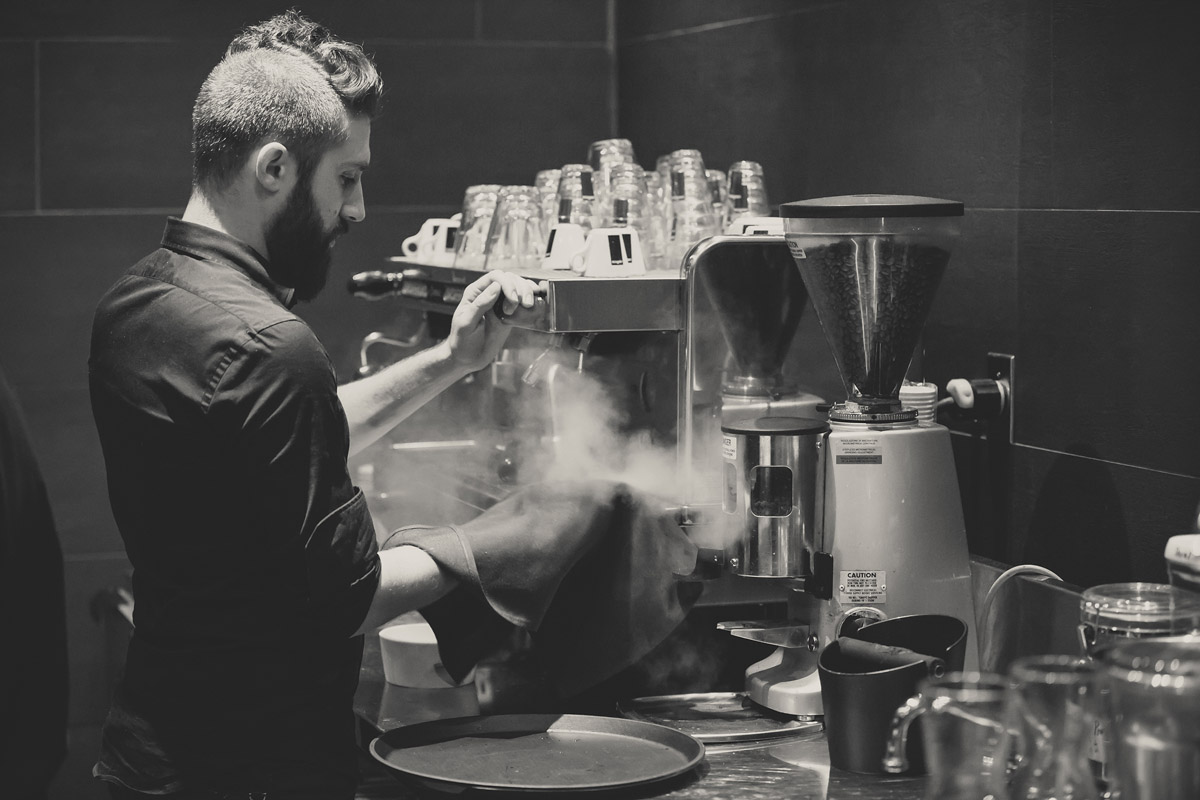
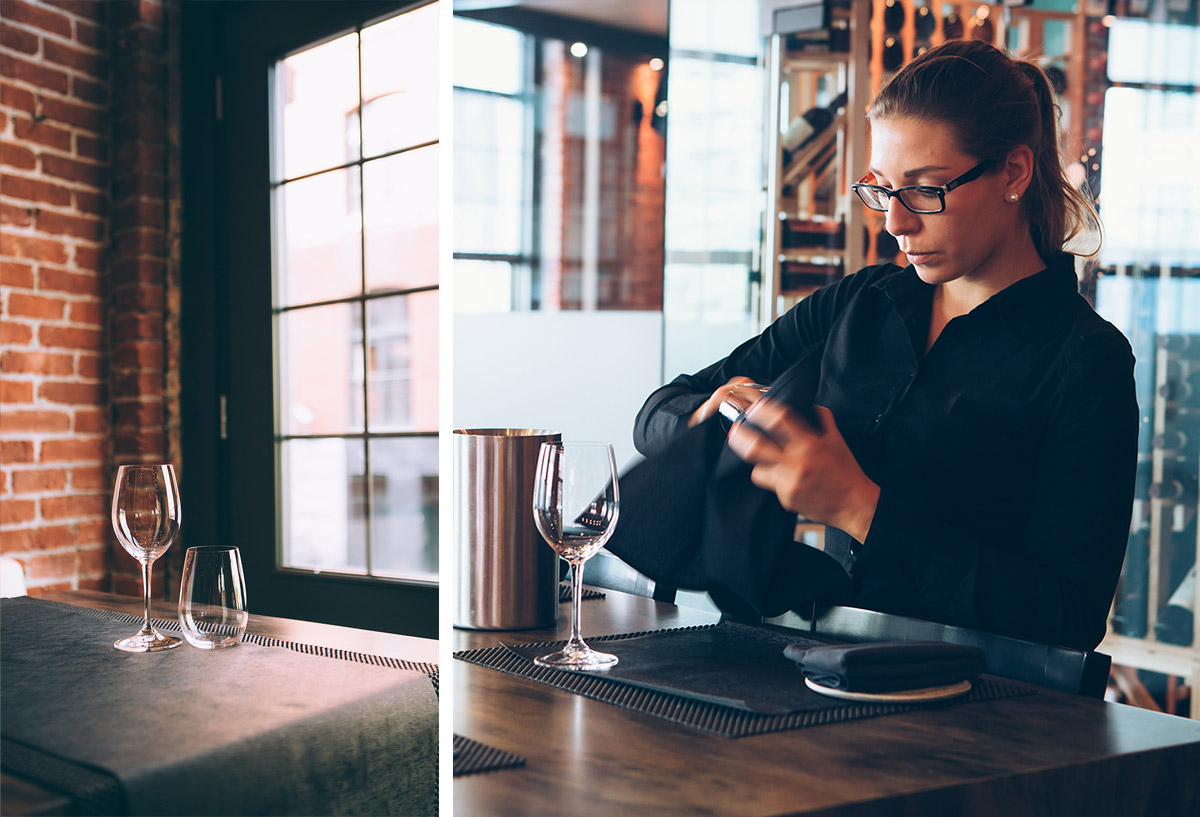
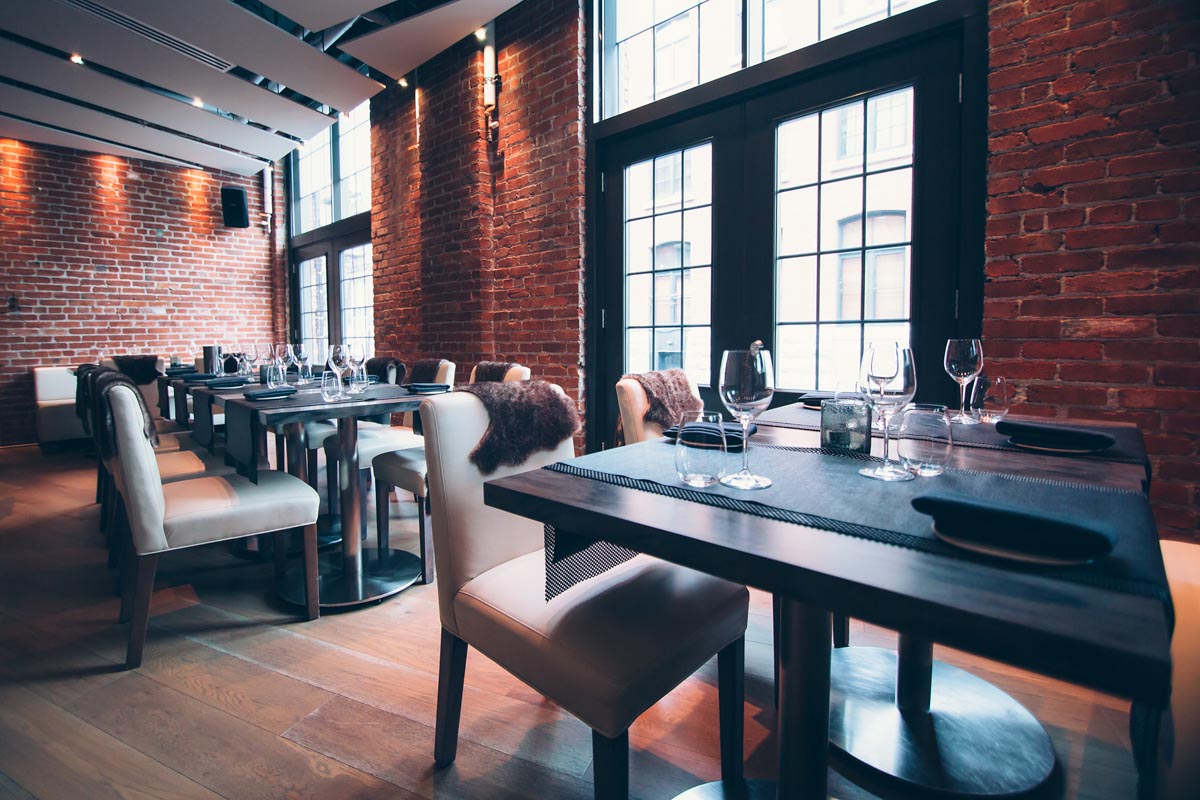
The late afternoon light fills the restaurant, a chic loft-style space complete with wood beams and exposed brick. Faux-fur pelts are draped over the backs of cream-toned chairs. The place is mostly empty as staff are busying themselves for this evening’s service. Wine glasses are steamed and buffed; the bar condiments restocked. The clanking of kitchen tools and cutting boards add anticipation to the background music. Chef and I take the corner spot by the window and a server stops by to fill our water glasses. This is the perfect setting to hear a chef’s story.
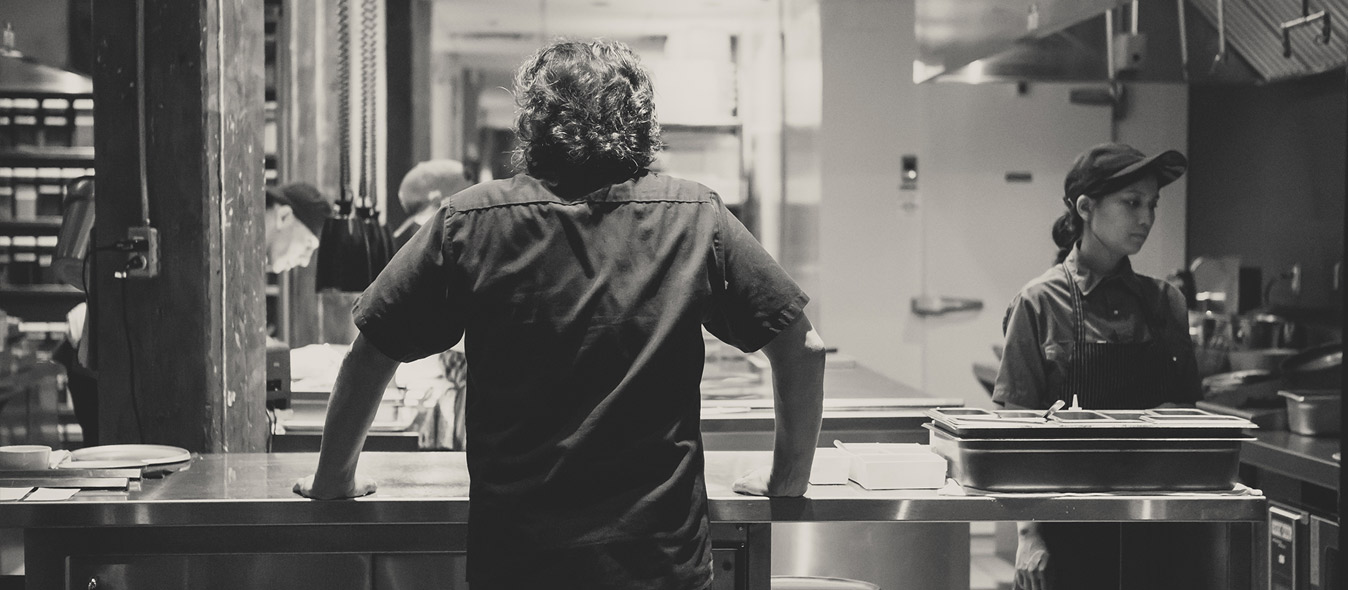
Let’s dive right in: How did you start working with food?
I’ve always loved the restaurant business, so I opened a café with my best friend. We wanted a place of our own where we could invite friends, have drinks, have a little bit of food; basically to party. But we needed a chef. Problem was, we couldn’t find anybody and couldn’t afford anybody. So I looked at my best friend at the time and I go, “You know what? Come tomorrow and I’ll make you some salads and sandwiches. Bring your girlfriend and you judge.” We were 21 at the time. So he comes in and was totally floored. He said, “Oh my God. We’ve been best friends forever and I had no idea. You have to do the food.” So as we’re growing this café, I’m getting more and more involved in the kitchen. The busier the café got, the more I fell in love with cooking. It’s funny, the image I remember of that time is me with bandaged fingers, because I had no professional training or anything. So I decided to sell and go to cooking school. I started getting very obsessive. I loved it. I honestly had no idea how much I loved it.
How has your past made an impact on who you are today as a chef?
I’m from Montréal. That’s really my cuisine. I’m not a chef that’s traveled. I’m not a chef that’s worked for a hundred chefs. I’m pretty much self-taught. I grew up with a lot of different cultures. Most of my friends were Indian, Chinese, different Asian cultures, and I really absorbed the food without knowing I was absorbing it. I always loved the different flavors; loved going to different restaurants. I never wanted to be a chef. But as I was doing all this, I guess I was building this database on how to be a chef.
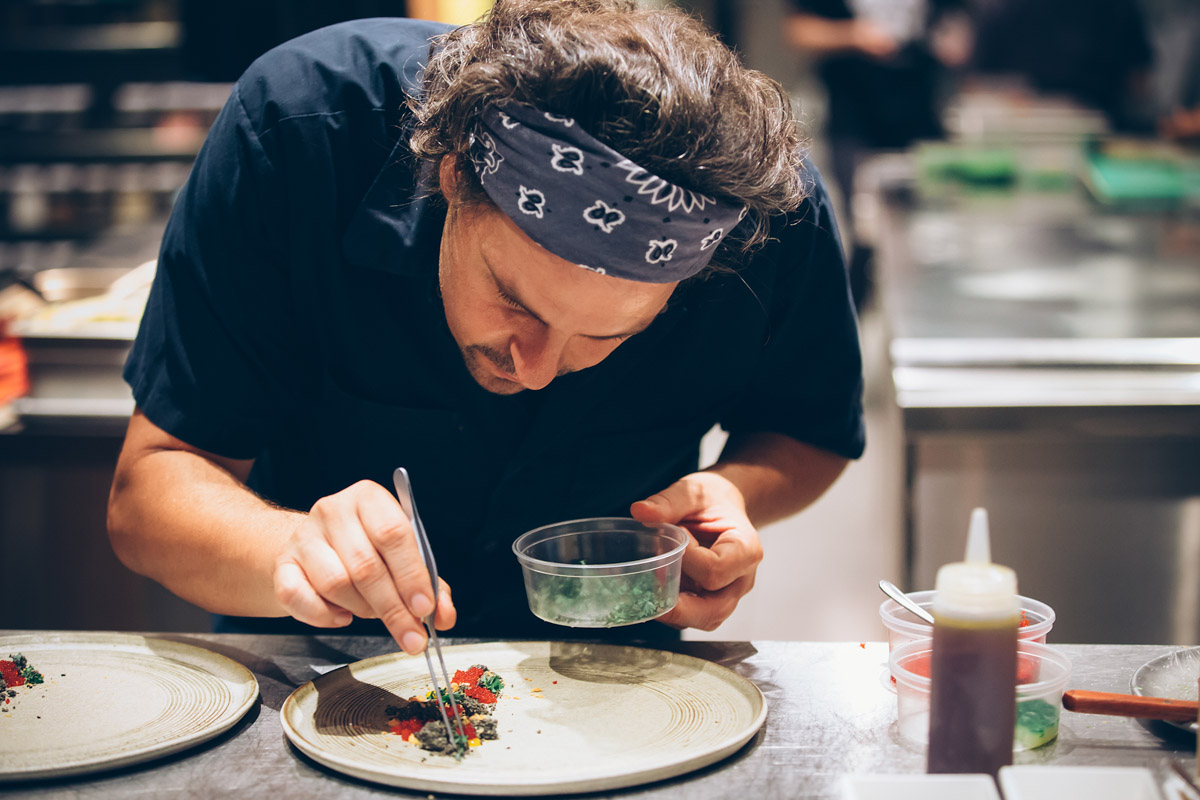
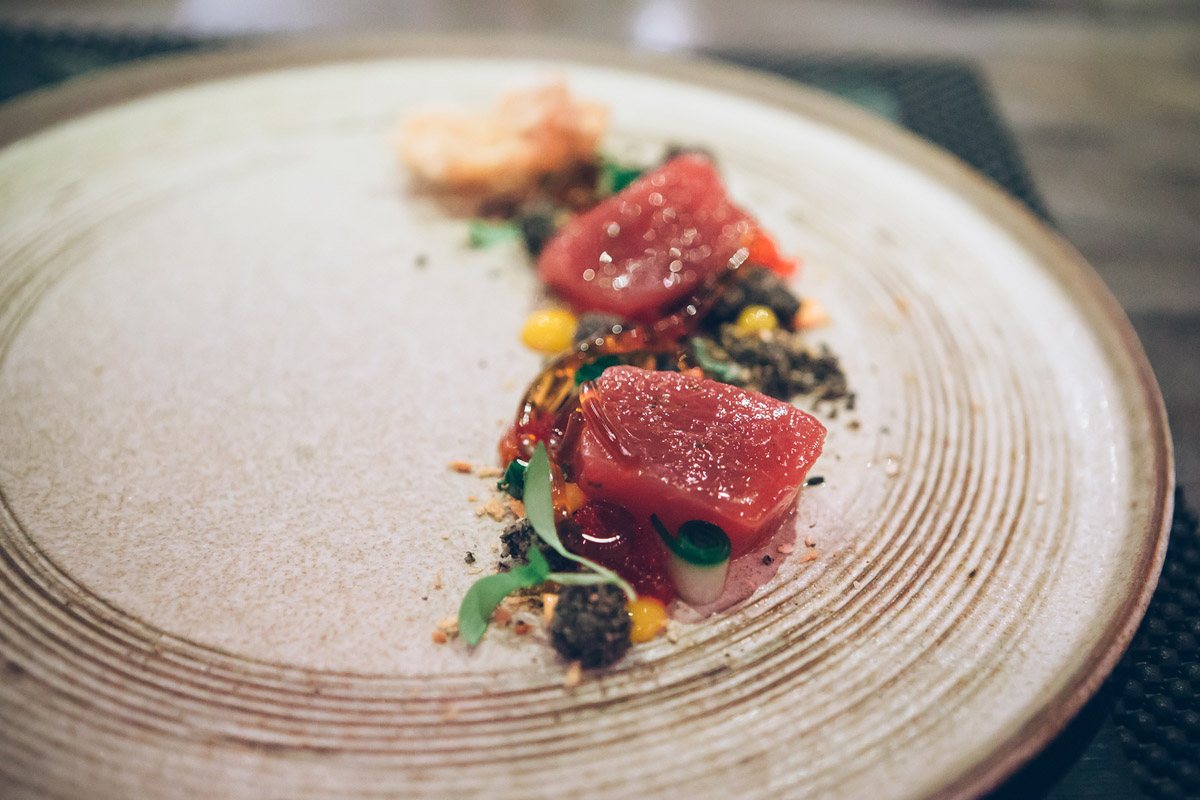
I’m not a chef that’s traveled. I’m not a chef that’s worked for a hundred chefs. I’m pretty much self-taught.
You mentioned your style is “Montréal cuisine.” How does your food differ from other chefs doing the same thing?
Many chefs do Montréal cuisine but they do recipes that are researched and have a lot of history: French, local natives; it’s a very Québécois thing. My recipes aren’t that. I’m a person that’s really affected by my surroundings. Every time I go to Chinatown or Little Spain, I’m like, “Wow, wow, wow.” I absorb what’s around me and I love different cultures. I say my food is “Modern Montréal” because it’s a mosaic. It’s a blend of different cultures that make Montréal what it is today. My food doesn’t go back a hundred years or two hundred years. I’m 40 years old, so I say it goes back 25 years.
My heart is smeared on the streets of Montréal. It’s right here. This is where it is. I walk up to Chinatown, buy some black vinegar and some mirin. I’m happy.
Given your Italian background, how much has your culture and family played a role in your food?
I was always intrigued by food. My mother’s an outstanding cook. She has a very strong influence on what I do. What’s on the plate? Not even 1 percent. How it gets to the plate, which to me is the most important thing about food? 150 percent. My mother never ate a tomato out of season. The philosophy of Italian food plays a big role in my cooking. It’s all about the product. Simple food, to me, does not exist. All food is complex. Just because you’re putting four items on a plate, doesn’t mean it’s simple. How did those four items get there? No one sees the groundwork. Putting four elements on a plate and making them shine is much more difficult than putting nine and bringing the flavors together.
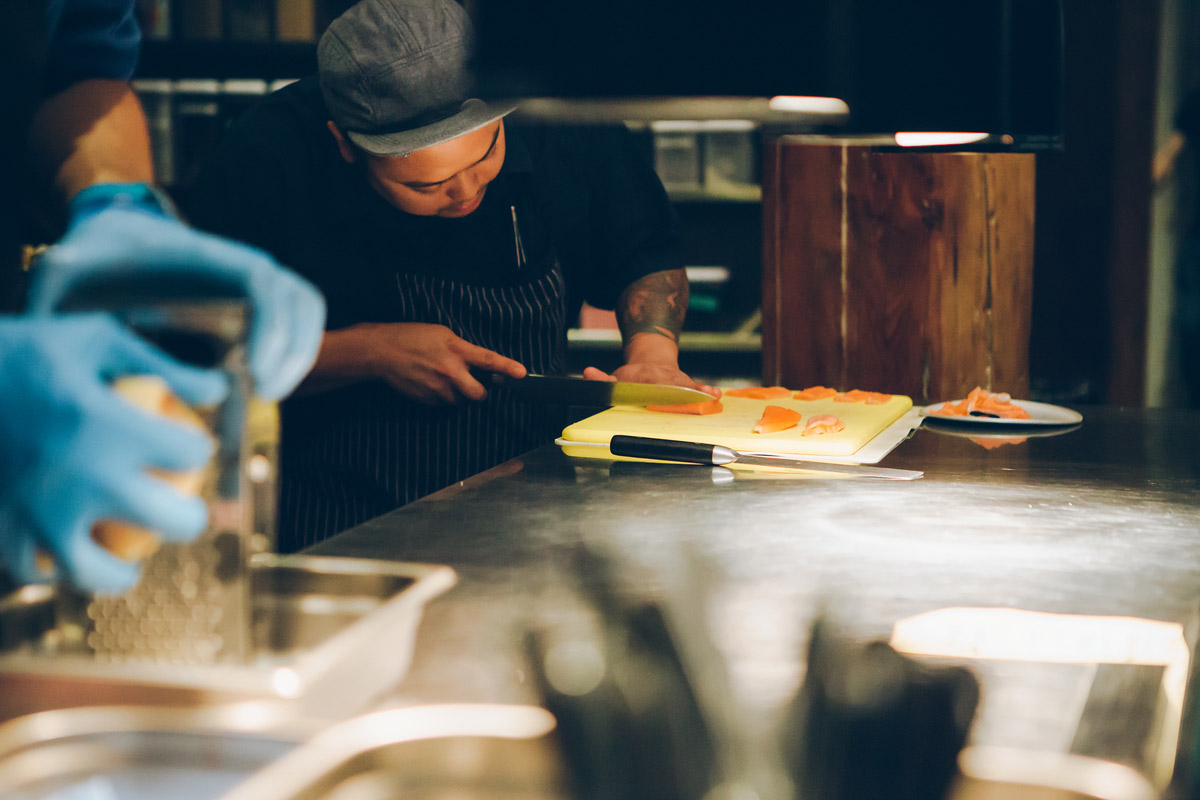
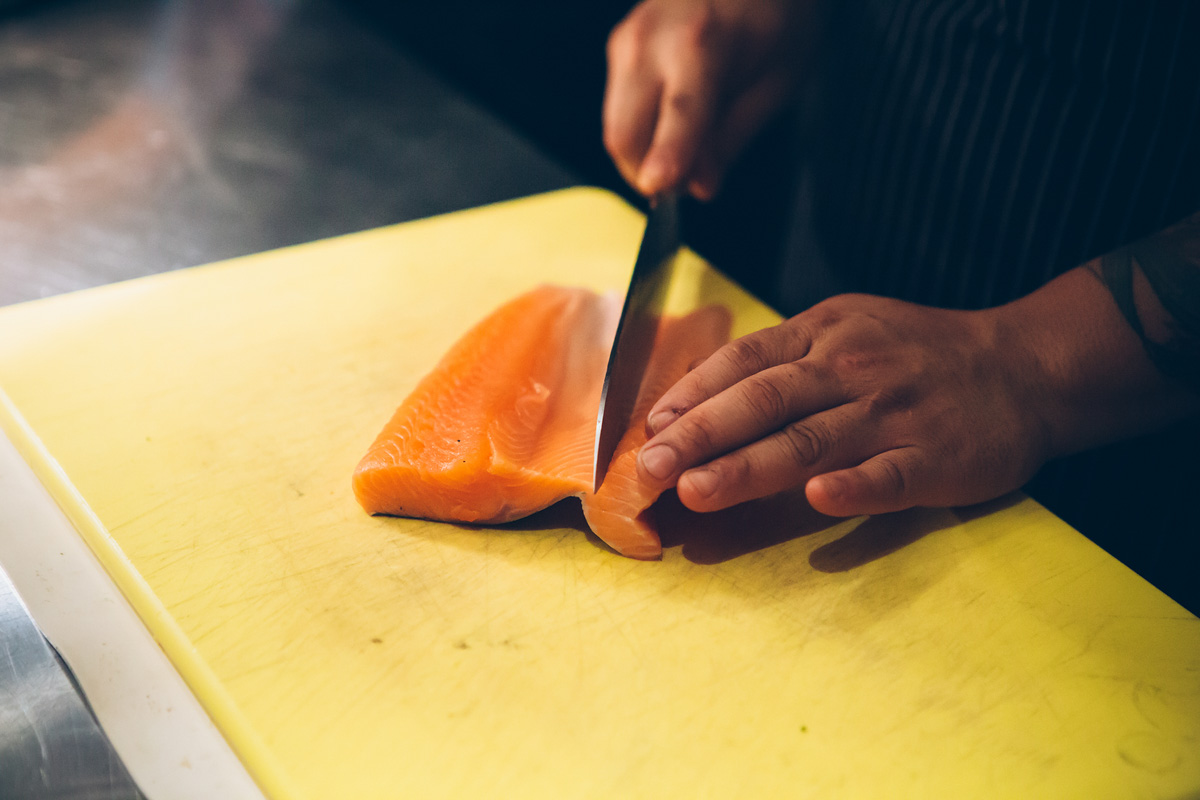
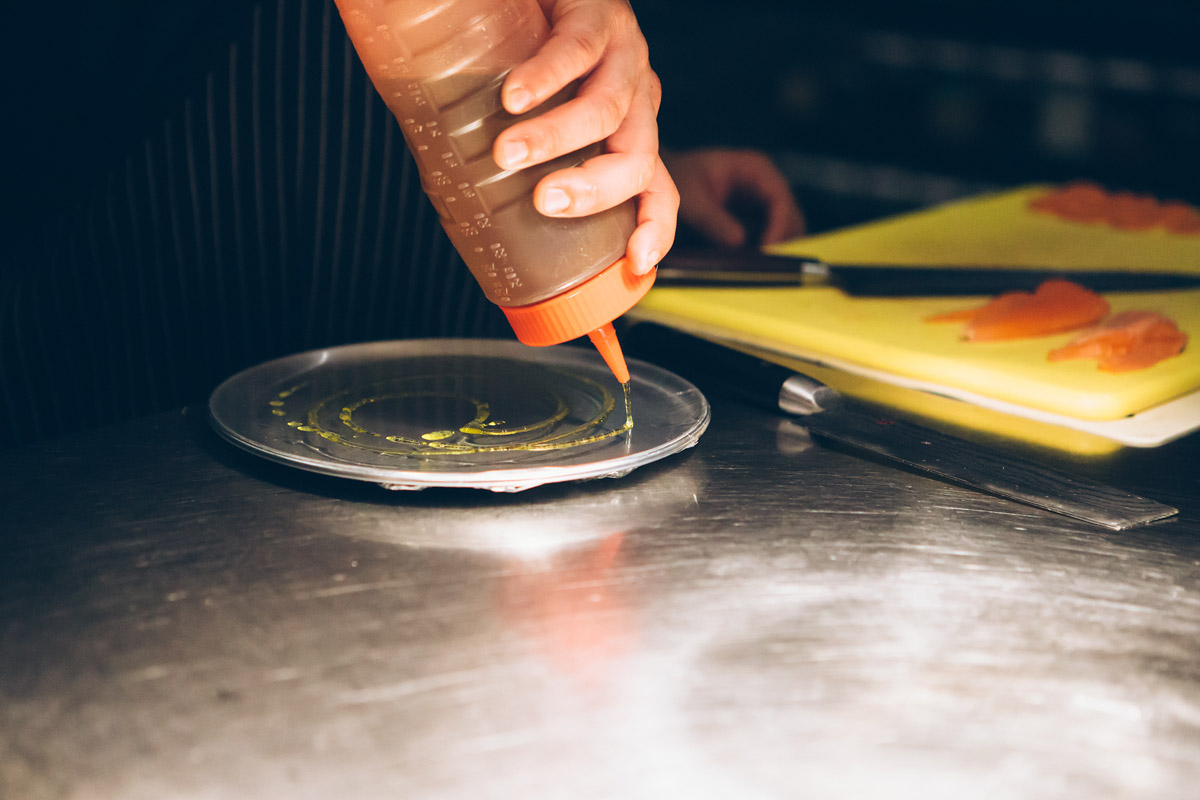
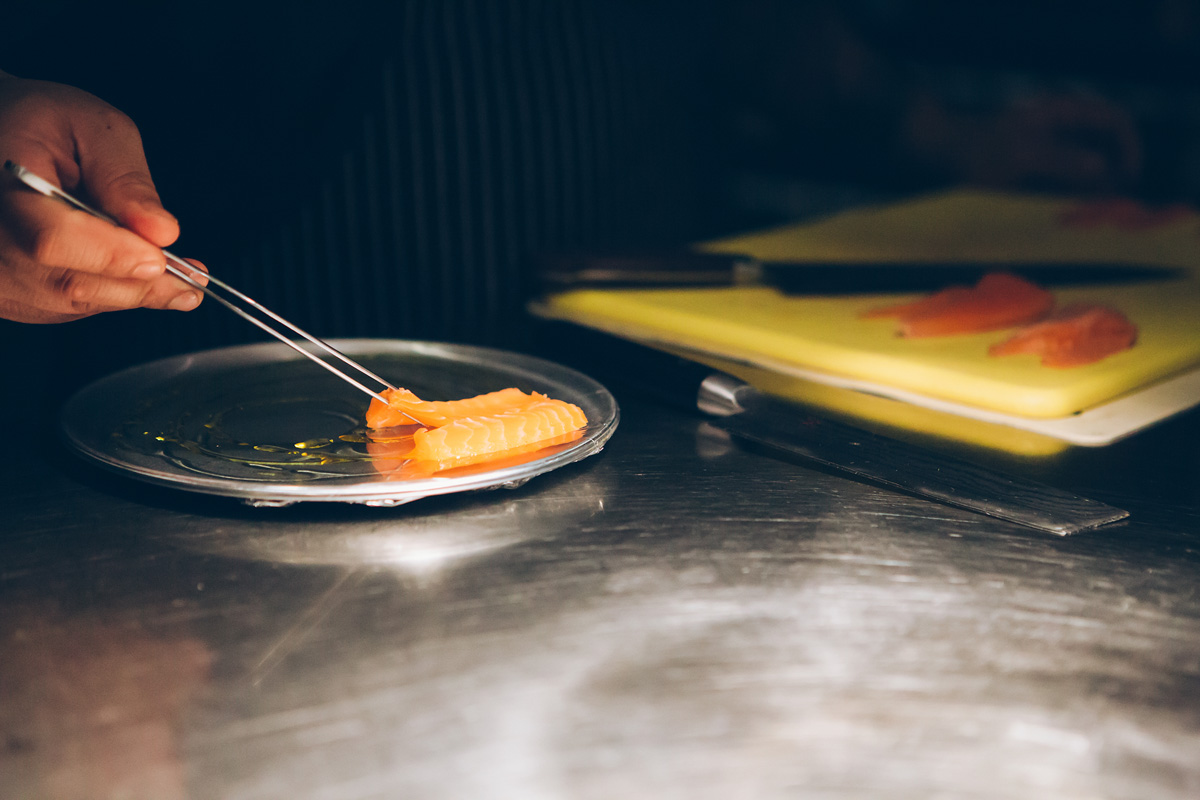
It’s all about the product. Simple food, to me, does not exist. All food is complex.
Do you source your ingredients locally within Québec or Canada?
I try to work as local as possible but I also work with the seasons of the world. Right now I’m buying Israeli mangos. They’re the best mangos in the world, and they’re only around for four weeks out of the year. For those four weeks, I put mangoes everywhere.
I’m a chef that goes to the market three times a week. But let’s face it, every market is not just local. We don’t live in California, or Italy, or Spain. We live in Montréal where five months of the year there’s nothing growing on this ground. Growing up in Montréal and in my heritage, we all had a cantina in our home for storing food. This is where we take the fruits of the summer, pickle them, make jams, cure them, ferment them, make vinegar; that’s why I have one in my restaurant. It’ll be full of stuff for me to use in the winter. So it’s not only fresh local product that I use, since that’s not possible in Montréal. I’m a seasonal chef with an edge. My food has a lot of different cultures in it, but it’s not a melting pot. It’s a mosaic.
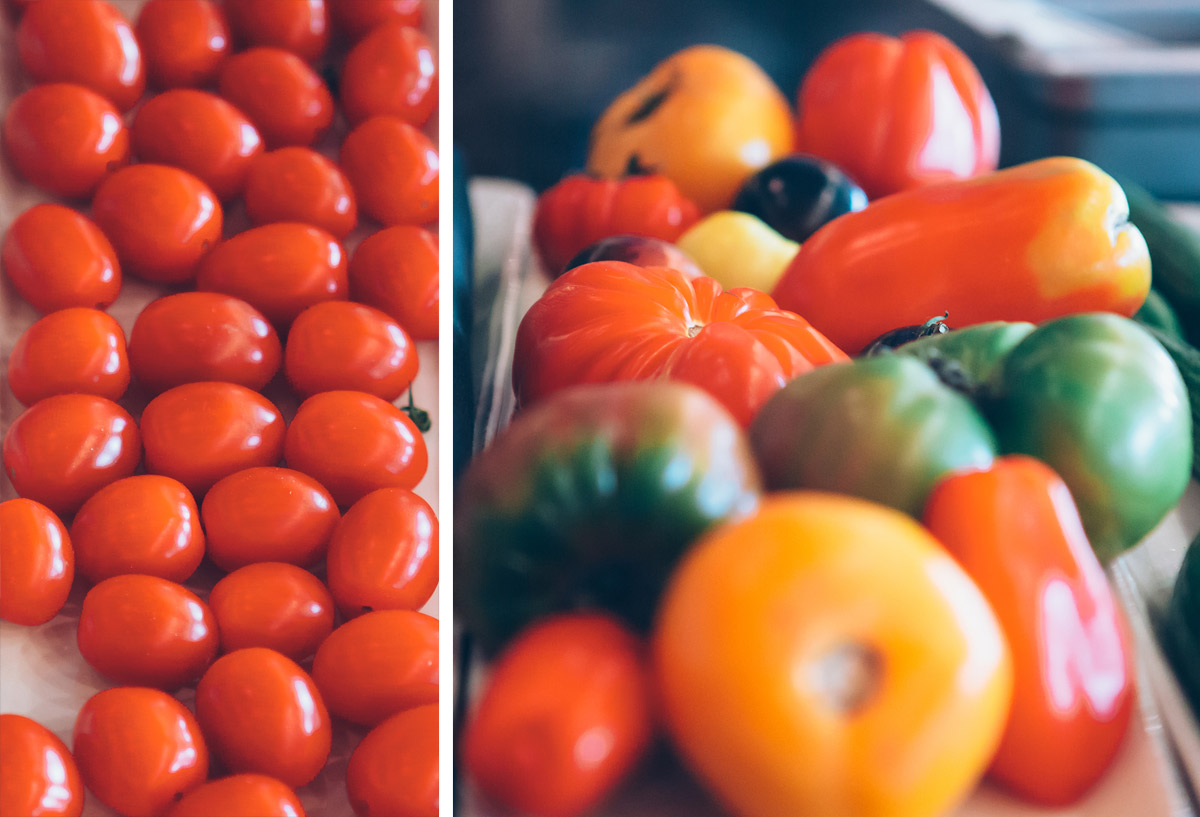
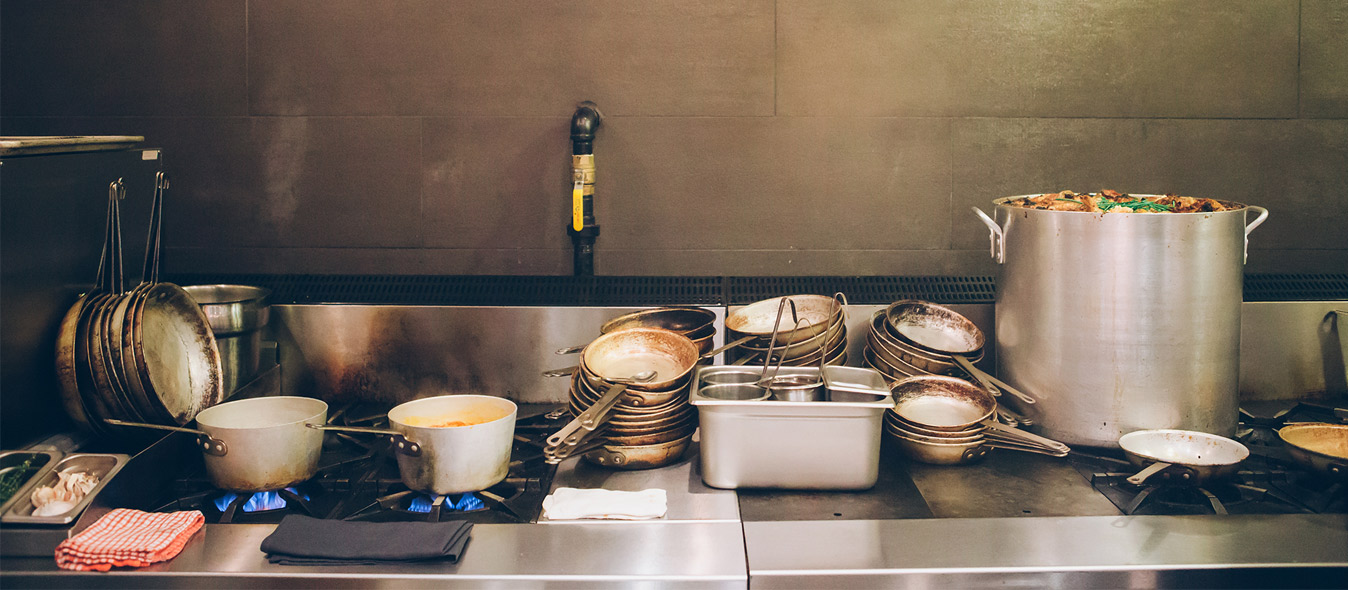
Your plating reputation precedes you. What’s your approach?
I plate very differently than other chefs. Most chefs I know are trying to create a beautiful plate. I’m all about seeing the beauty of the product. When you’re searching so hard for that product, you don’t want to hide it. I plate by thinking how the customer is going to eat the dish. That’s very important. How are they going to put their fork? How are they going to cut? I want them to pick this up with this, so how do I give them instructions without giving them instructions? I’m constantly thinking about that.
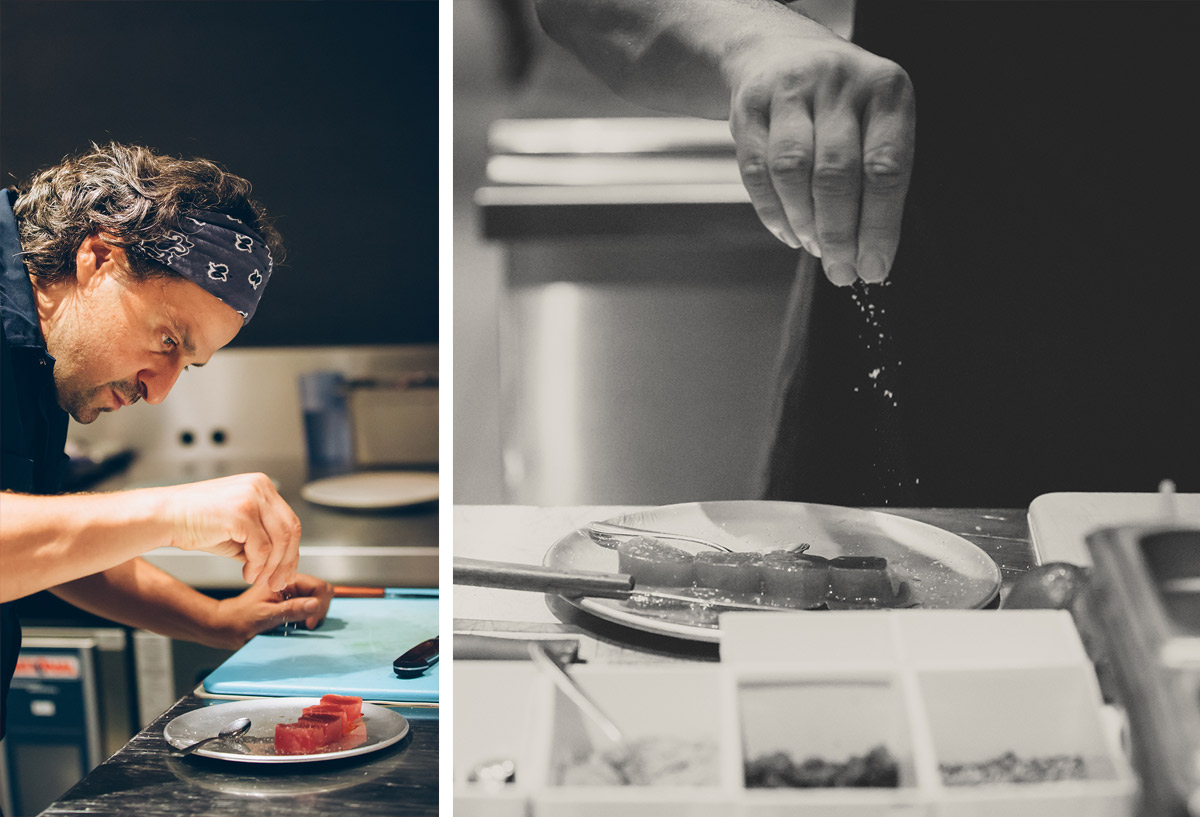
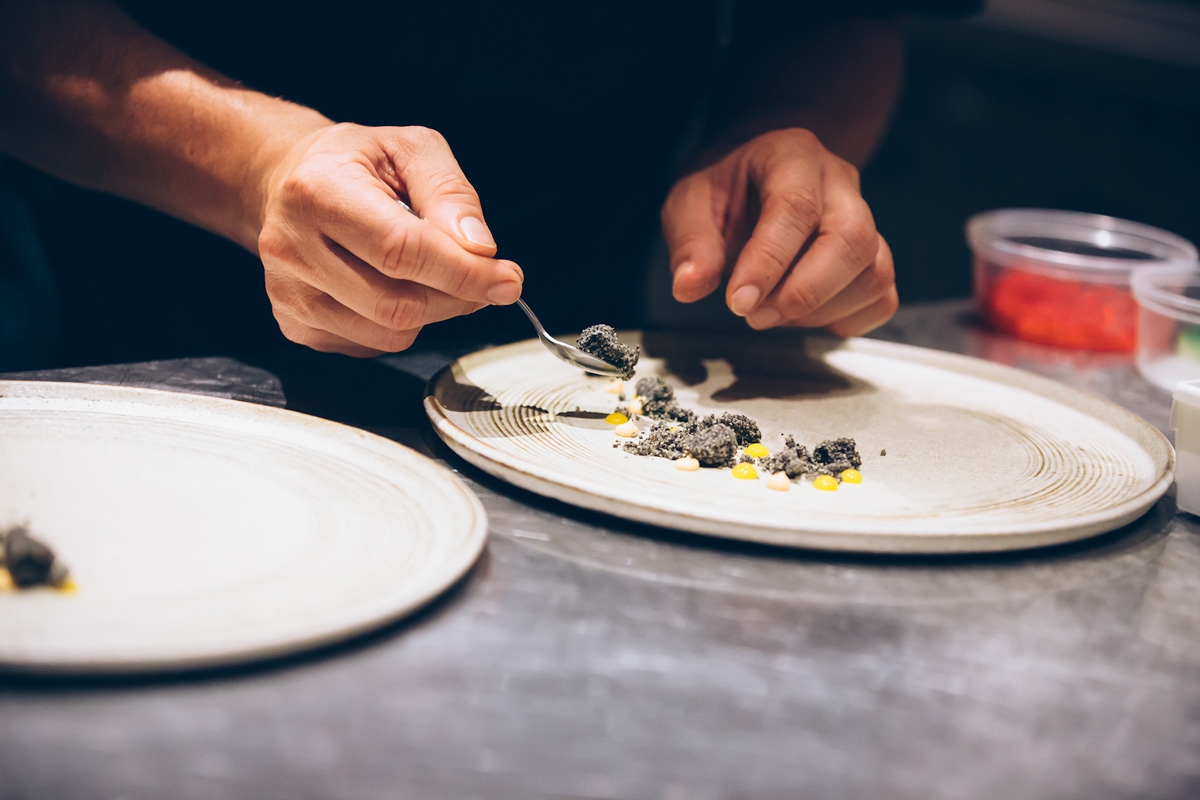
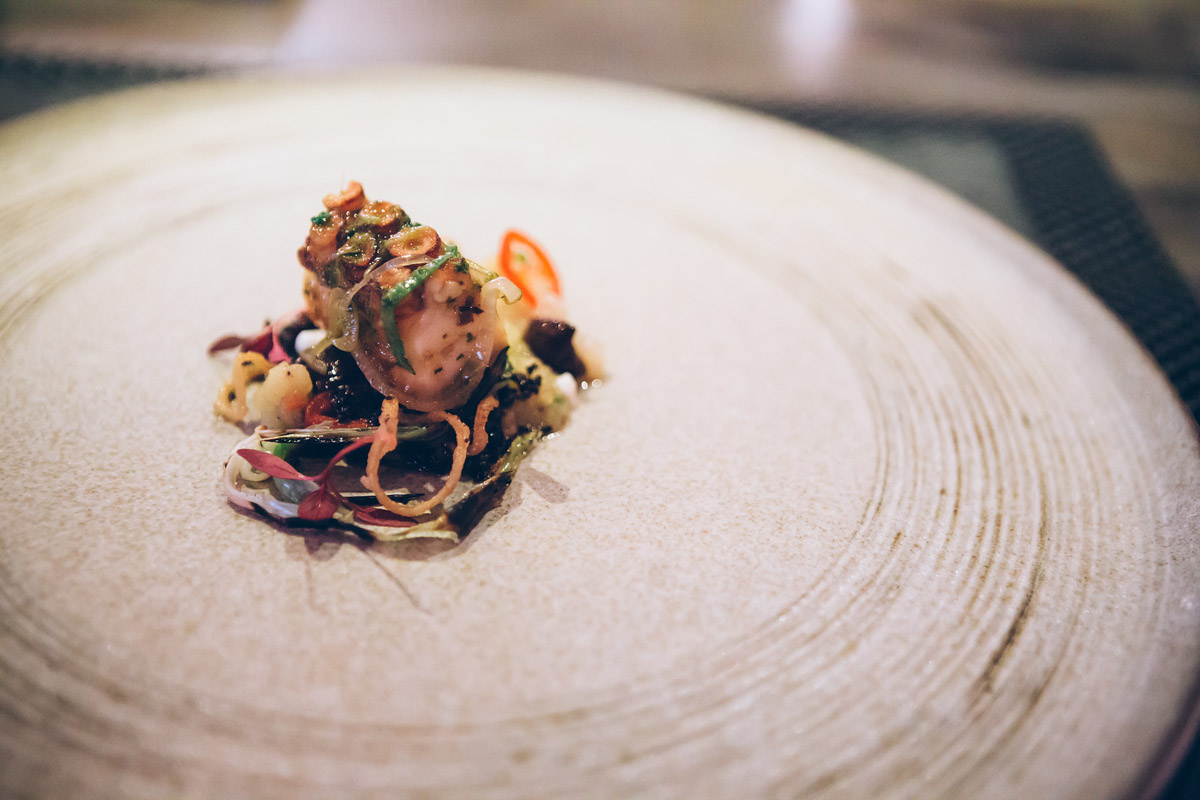
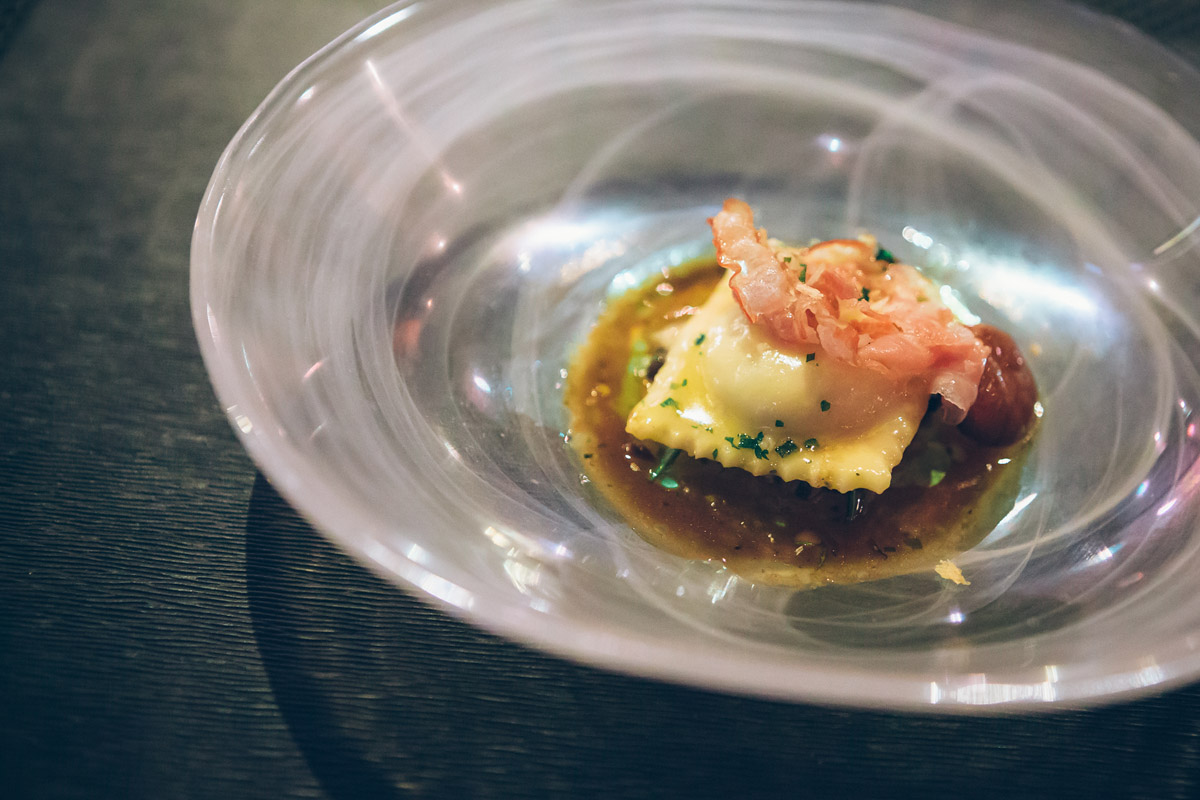
What advice would you give young cooks starting out?
Advice I’d give young cooks is work, work, stage (apprentice). Don’t look at the money. This industry was not built on money. It wasn’t built on star chefs. It wasn’t built on tattoos. It wasn’t built on The Food Network. It was built by the outcasts of the world. People that loved to live at night. We didn’t like to go by anybody’s rules. And we loved being on stage. What The Food Network is selling to you, we were doing before that was even a dream. We needed that adrenaline through our blood. It got me going to work everyday. I remember being 15, a busboy at a restaurant during the summer, and I was doing five doubles a week. I’d get to work at ten a.m. and finish at one a.m. But I was excited to go back the next day. It was such a great rush to work with those guys. To watch it click. We were like kings of the world.
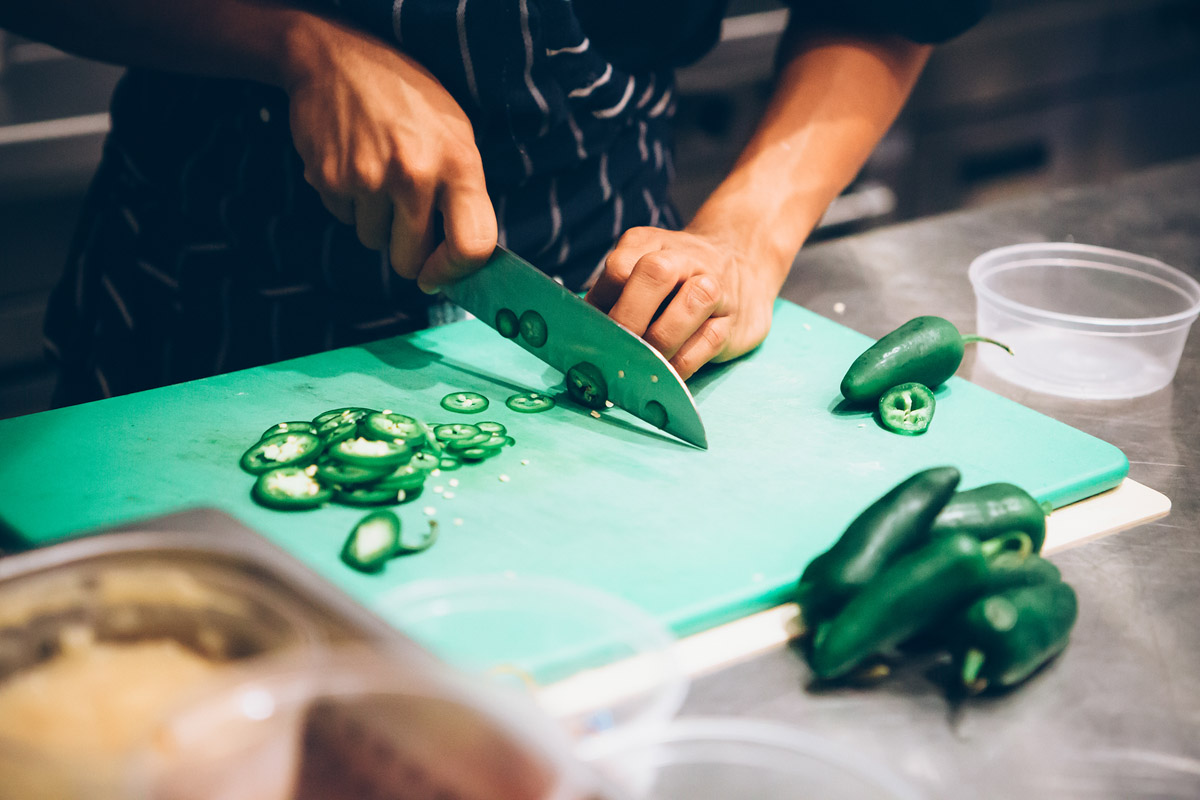
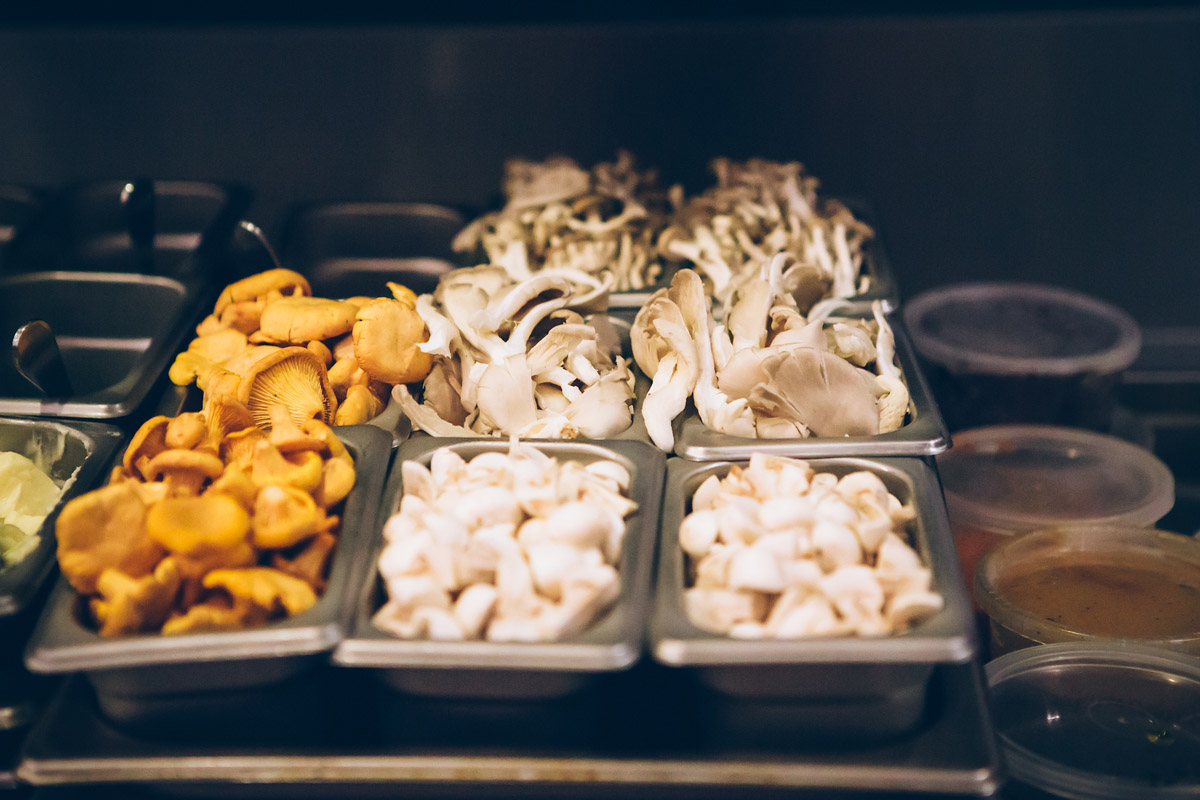
Here’s a two-part question: 1) What’s going to keep you pumped about doing this for the next 20-30 years? And 2) Do you think there’s ever a point when you’re too old to be in the kitchen?
I think I’m an entertainer. I love the restaurant business. Before I fell in love with cooking, I fell in love with the business. I love the hospitality. I love the adrenaline. When there are 35 people sitting in your restaurant all in need of food at the same time… it’s all about the rush. It really gets the blood pumping.
I think the great thing about our industry is the older you get, the more respect you get. Chefs start hitting 45, 50 and that’s when you notice they’re coming into their own. That’s when they start getting all this respect. It’s a trade for paying your dues. There’s a lot to learn and one year of culinary school isn’t going to do it. You’ve got to be patient. The money and respect will come.
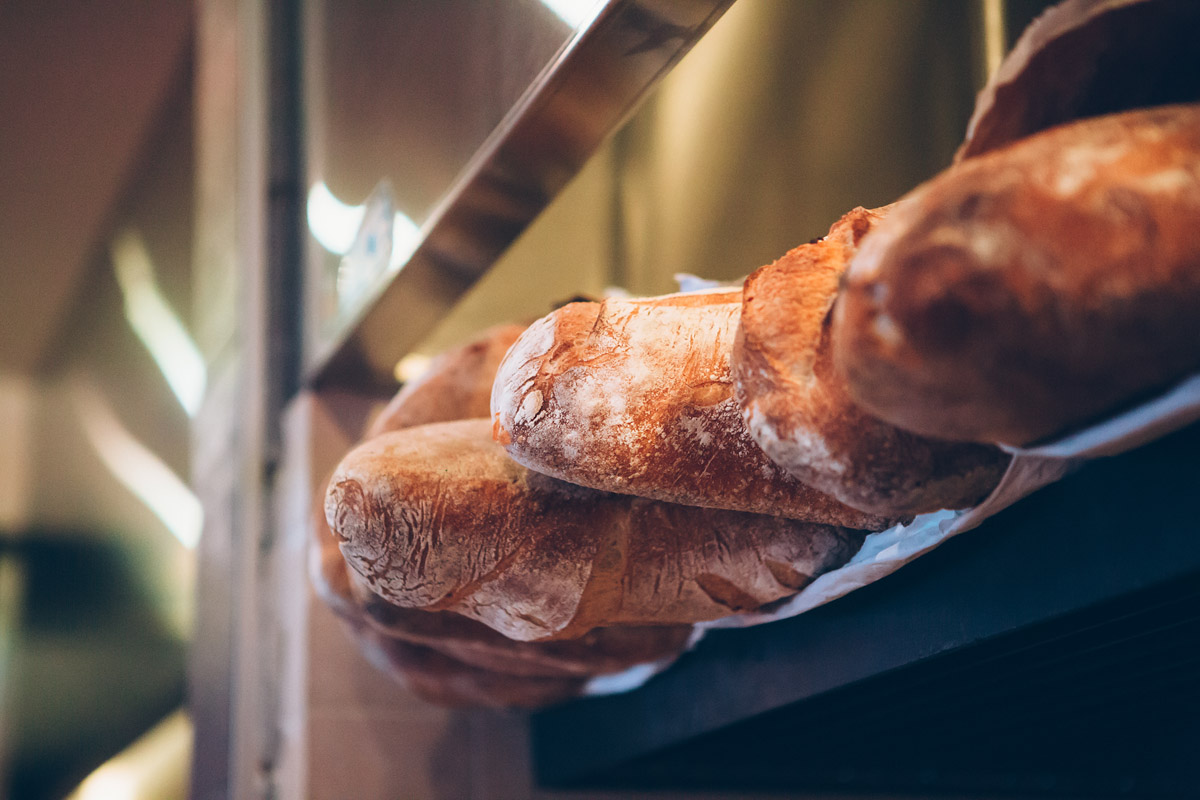
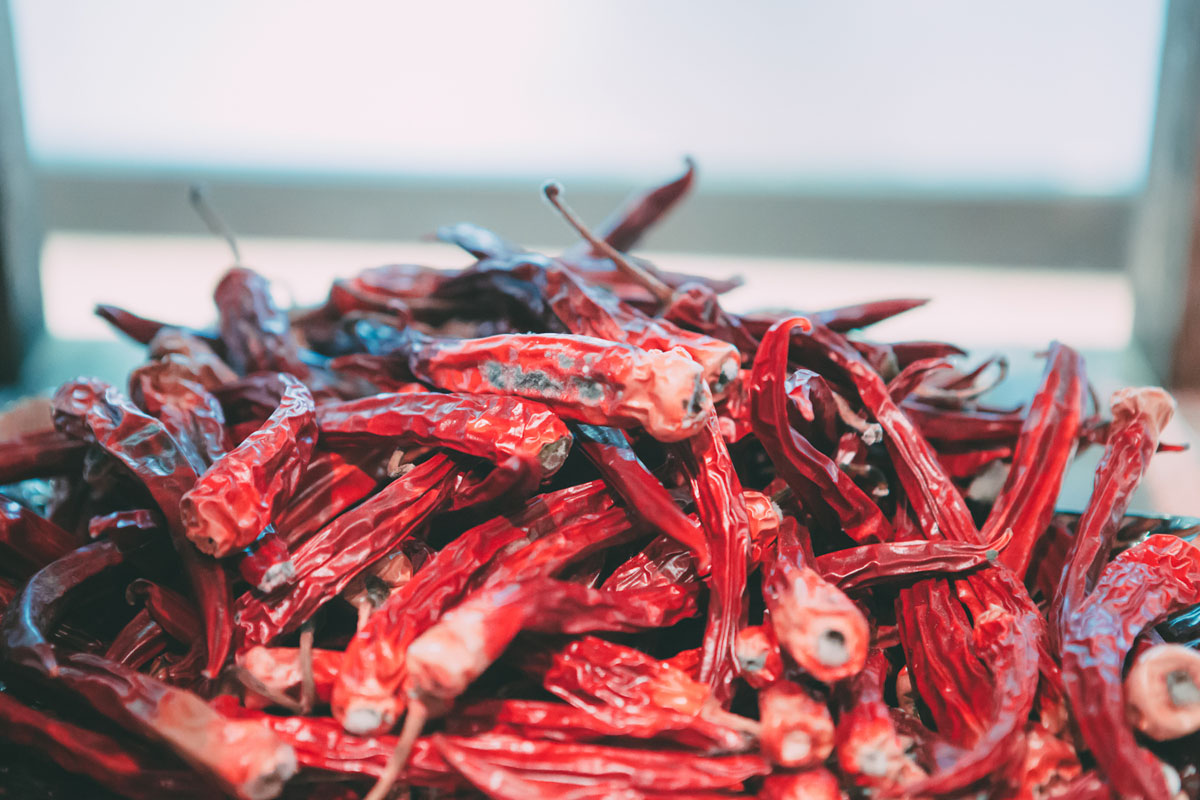
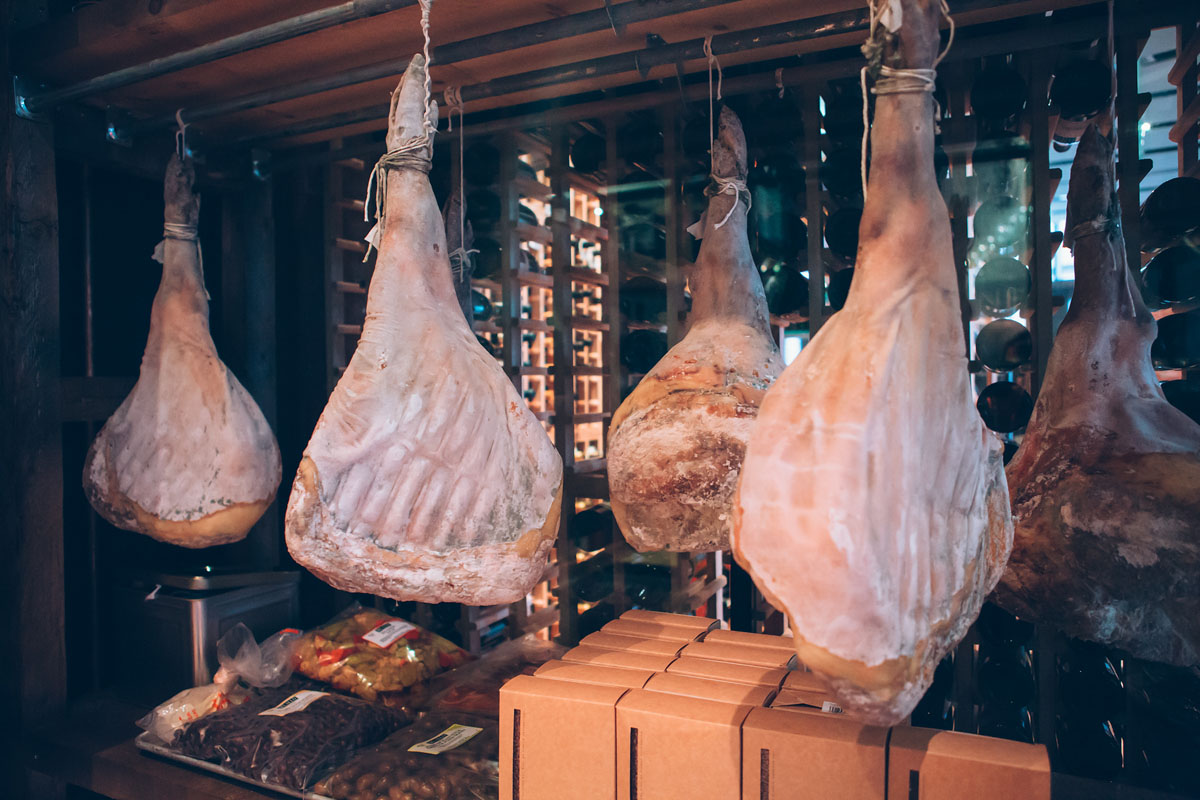
Final question: If you could have dinner with five people, dead or alive, who would they be?
That’s a good one… Ferran Adrià would definitely have to be there, just so I could pick his brain. I’d be giddy as a schoolgirl. The rest I don’t think would be in food. I have a love affair with music and artists. I love the 70’s so I’d probably have Marc Bolan there from T. Rex. Johnny Thunders from the New York Dolls. Al Pacino. Trent Reznor, he’s also a great one to have there. And my son and wife. I’d think we’d all have a great time together. There would be a lot of drinking, for sure. These are people I see as having a great artistic view. You don’t have to be an artist; just have an artistic view.
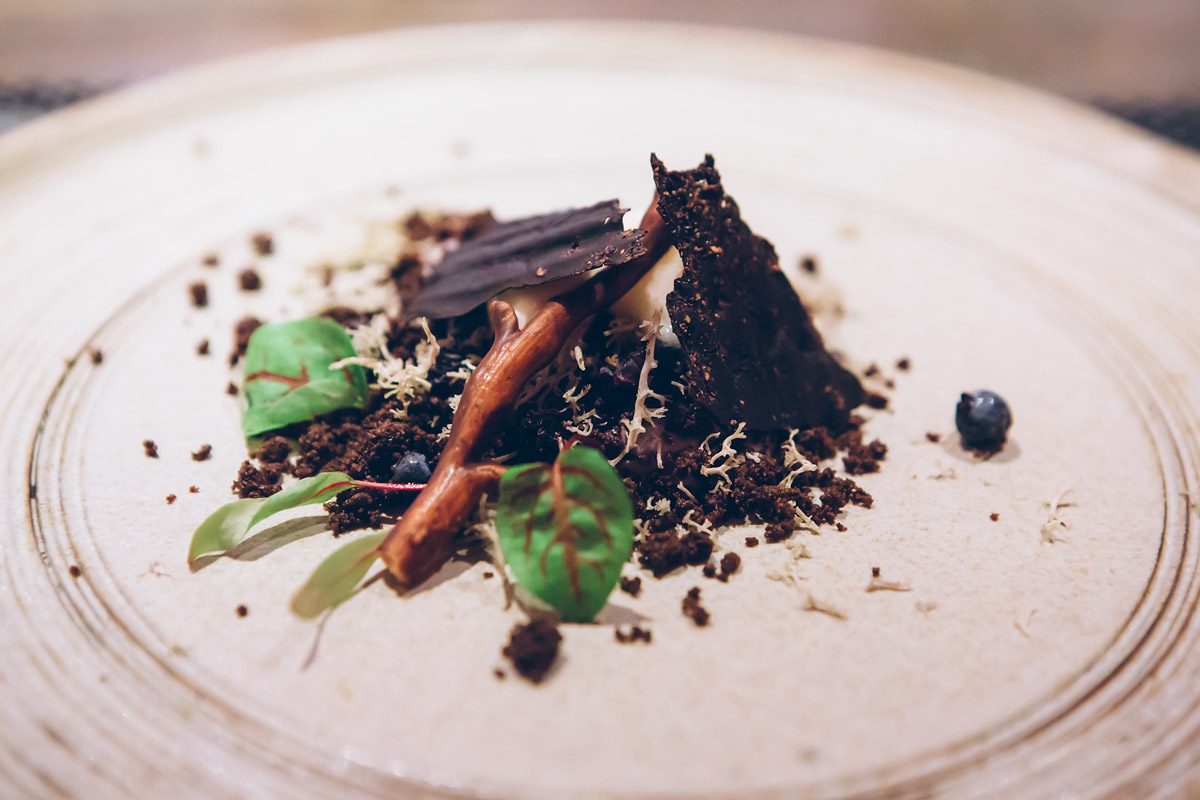
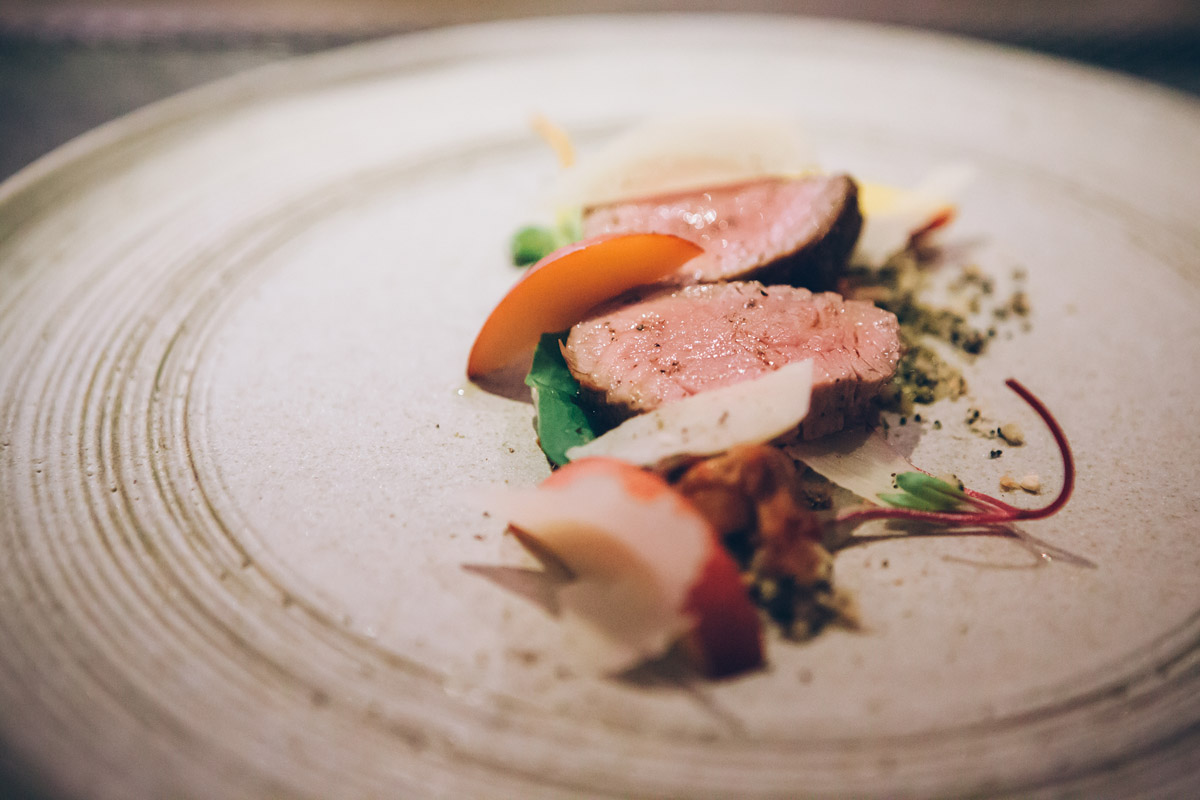
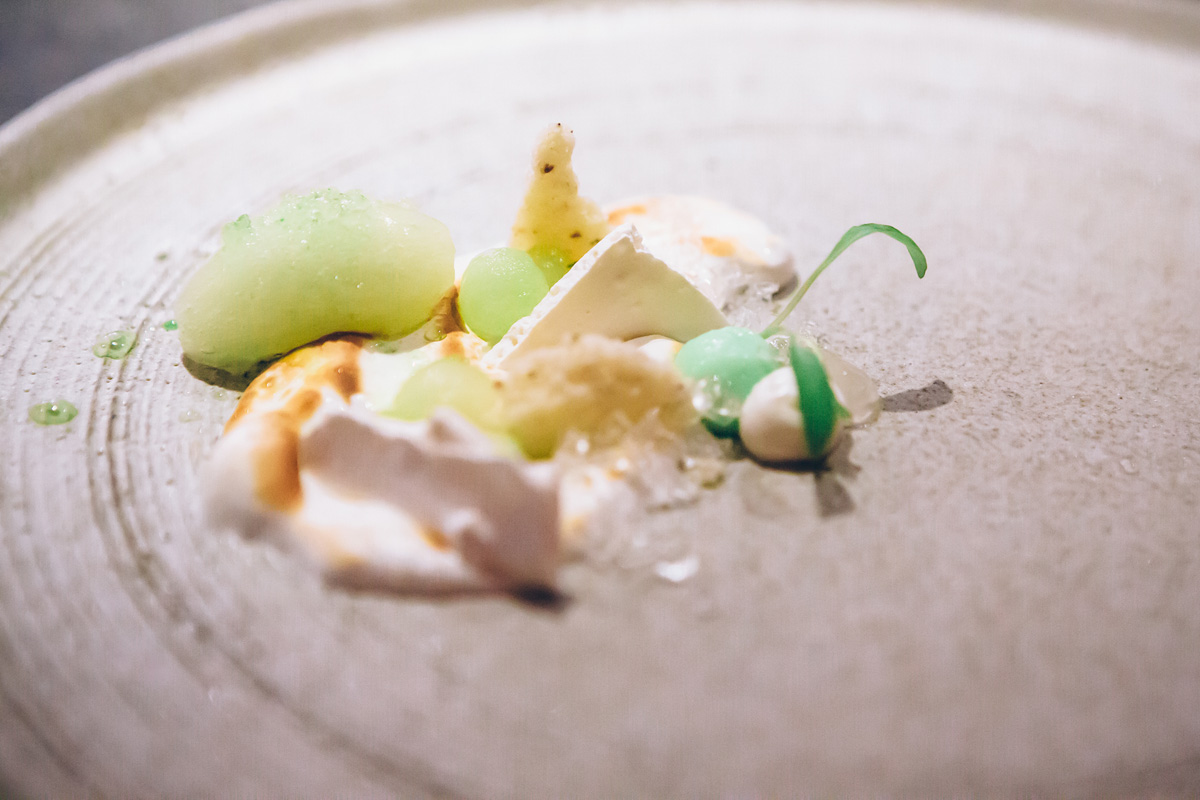
—
Chef Mercuri takes a quick peek at his watch. Doors will be opening soon.
“We’re going to have a tasting for you guys. We’ll get started in about 30 minutes then?” he asks, but it’s more of a statement than a question. I can see the transformation immediately from laid back, I’m-everyone’s-buddy Joe, to a seasoned chef who’s about to get to work. He’s got a kitchen to run and it’s almost game time.
—
So what exactly is Chef Joe Mercuri’s “Modern Montréal” cuisine? Here’s a taste of what I enjoyed:
- Tuna, mango, palm-soya, black sesame
- Octopus, Taggiasche, pear, red chili
- Ravioli, truffle, chanterelle, pancetta
- Veal, nectarine, poppy seed, goats yogurt
- Meringue, honey dew, cucumber, gin
- Blueberry, white ale, sour cream, oakmoss
—
Mercuri Montréal
645 Rue Wellington
Montréal, Québec
H3C 1T2 Canada





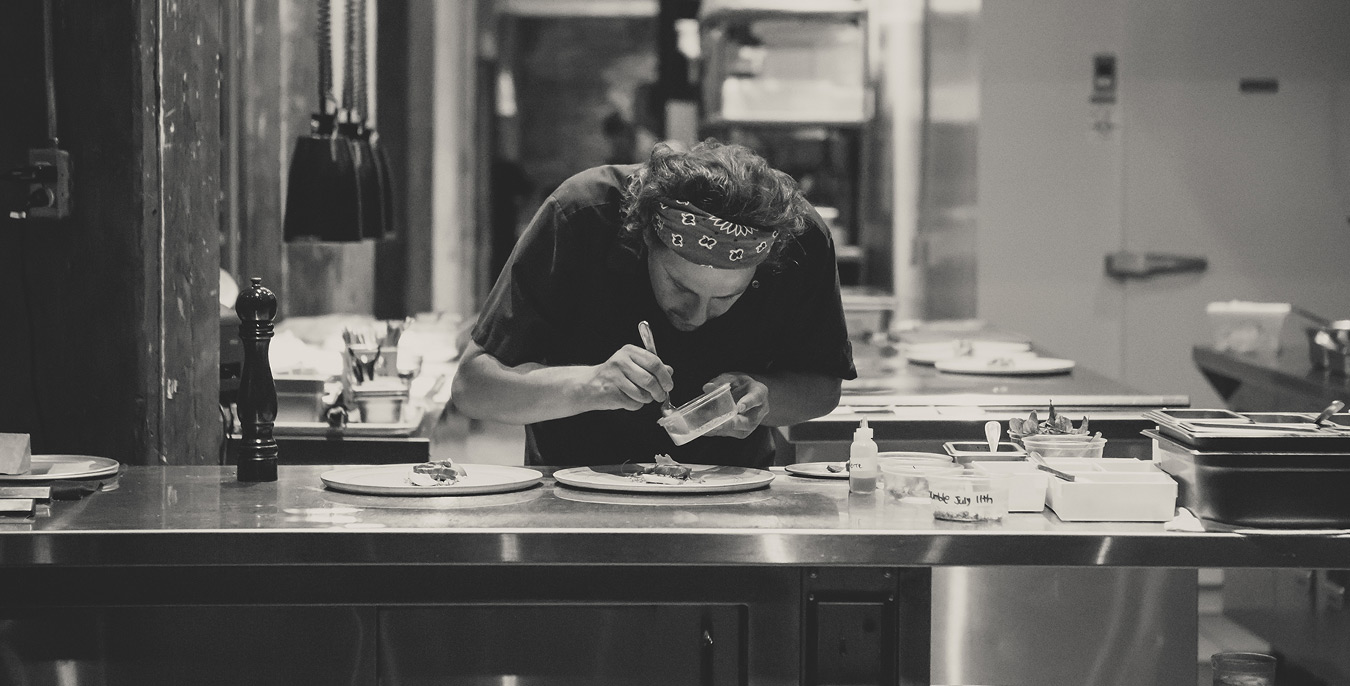

Our comments section is for members only.
Join today to gain exclusive access.